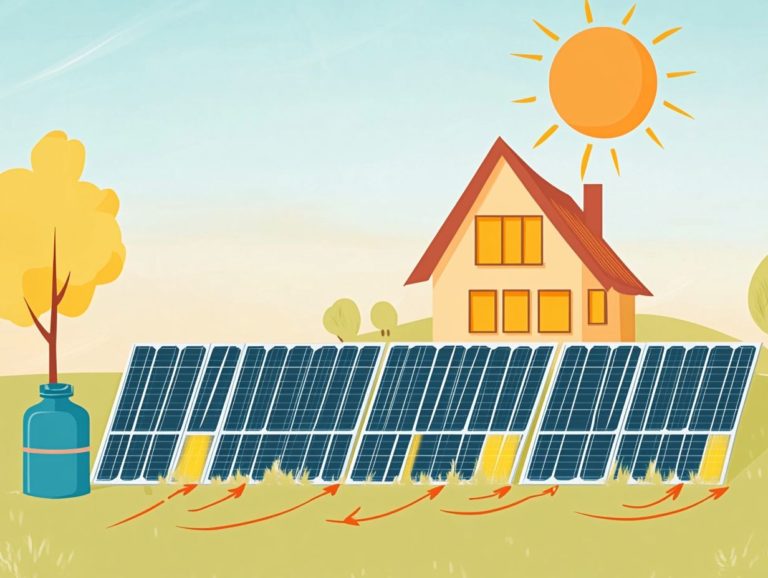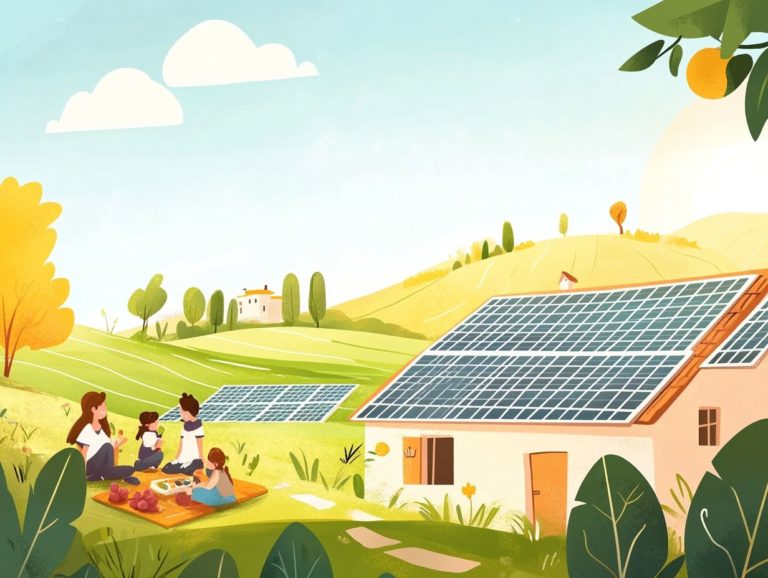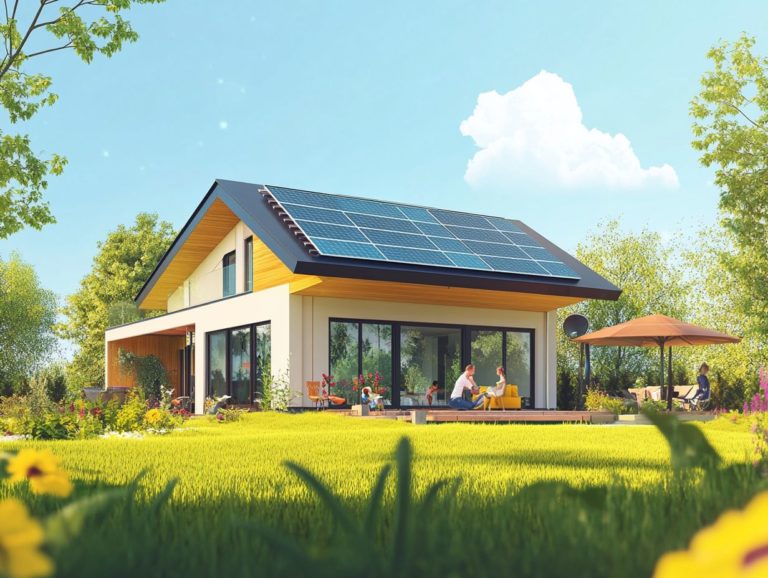“5 Essential Features of Smart Solar Systems”
As the world increasingly embraces renewable energy, smart solar systems are leading the charge in this remarkable transformation.
These advanced setups harness sunlight and come equipped with features that significantly enhance efficiency, monitoring, and maintenance.
Imagine how these innovations can change energy for homeowners and businesses!
You ll want to explore five essential features:
- remote monitoring and control,
- energy storage capability,
- predictive maintenance,
- real-time data analysis,
- scalability.
Dive in now to see how smart solar systems can transform your energy usage and management.
Contents
- Key Features:
- 1. Remote Monitoring and Control
- 2. Energy Storage Capability
- 3. Predictive Maintenance
- 4. Real-Time Data Analysis
- 5. Scalability and Flexibility
- What Is a Smart Solar System and How Does It Work?
- What Are the Advantages of Remote Monitoring and Control?
- How Does Energy Storage Benefit Smart Solar Systems?
- Why Is Predictive Maintenance Important for Smart Solar Systems?
- What Can Real-Time Data Analysis Tell Us About Solar Energy Usage?
- How Can Scalability and Flexibility Affect the Performance of a Smart Solar System?
- Understand the Potential Drawbacks of Smart Solar Systems
- Discover How a Smart Solar System Can Benefit Homeowners and Businesses
- Understand Future Developments in Smart Solar Technology
- Learn How to Choose the Right Smart Solar System for Your Needs
- What Are the Cost Considerations for Installing a Smart Solar System?
- What Are the Environmental Benefits of Using Smart Solar Systems?
- How Can Smart Solar Systems Help with Energy Management and Conservation?
- Frequently Asked Questions
- What are the 5 essential features of smart solar systems?
- What is advanced tracking technology?
- How does integrated energy management work in smart solar systems?
- Can smart solar systems be remotely monitored and controlled?
- Why is energy storage capability important in smart solar systems?
- Are smart solar systems compatible with smart home systems?
Key Features:

Remote monitoring and control allows for easy management and optimization of solar systems, providing convenience and cost savings. Energy storage capability ensures constant access to clean energy, even during power outages or peak demand times. Predictive maintenance helps to prevent system failures and increase efficiency, saving time and money on repairs.
1. Remote Monitoring and Control
Remote monitoring and control of solar power systems is essential for optimizing energy generation. This capability gives homeowners and businesses the power to navigate their solar journey effectively while minimizing the environmental impact.
Advanced solar inverters track performance metrics in real-time, making it easy to monitor energy production and system health. Companies like EnergySage offer integrated platforms that not only visualize your data but also provide insights for maintenance and troubleshooting, elevating your overall energy practices.
Mobile apps and online dashboards send instant notifications and alerts about your system’s performance, enabling timely interventions. This level of oversight allows you to maximize your solar investment, ensuring a steady supply of clean, renewable energy while significantly reducing reliance on conventional energy sources.
2. Energy Storage Capability
Energy storage capability is essential for your smart solar system. It allows you to integrate solar batteries, like the Tesla Powerwall, which maximizes the benefits of renewable energy by providing a reliable power supply, even when solar generation dips.
This feature solves the problem of not having energy during cloudy days or at night, giving you the ability to optimize your energy usage. By storing surplus energy collected during sunny hours, solar batteries create a reservoir you can draw from later, ensuring that your electricity supply remains both sustainable and cost-effective.
Products such as the LG Chem RESU and the Sonnen ECO are impressive options, offering versatility and high performance in energy management. These batteries reduce your reliance on grid power, leading to enhanced energy efficiency and cost savings over time.
Choosing these solutions lets you fully harness the potential of solar energy.
3. Predictive Maintenance
Predictive maintenance is vital for optimizing the performance of your smart solar systems. By leveraging solar performance monitoring, you can proactively address issues, ensuring that your systems not only meet energy efficiency standards but also maximize the durability of your solar panels.
Anticipating potential failures before they happen allows you to safeguard the efficiency of energy production while significantly extending the lifespan of your solar installations. With advanced data analytics at your fingertips, you are given the power to make informed decisions about necessary interventions, reducing the likelihood of costly repairs and unexpected downtimes.
Implementing effective maintenance strategies can also mitigate the environmental impact typically associated with solar maintenance practices, promoting a more sustainable approach. Ultimately, embracing predictive maintenance revolutionizes how your solar technology operates, paving the way for a cleaner, greener future in energy consumption.
4. Real-Time Data Analysis
Real-time data analysis in smart solar systems gives you the power to track solar energy generation and consumption patterns. This provides valuable insights that enhance energy efficiency and diminish reliance on fossil fuels, positively impacting the environment.
By continuously monitoring these metrics, you can identify peak production times and adjust your energy consumption accordingly. This ensures you make the most of renewable resources.
You can see patterns in energy usage over time, enabling you to devise strategies for minimizing waste and optimizing storage solutions.
With various tools like energy management software and IoT sensors at your disposal, this analysis becomes seamless. Intuitive dashboards visualize essential metrics such as energy generation rates, consumption spikes, and battery performance all at your fingertips.
Armed with these insights, make informed decisions now to promote sustainable energy practices while also contributing to long-term economic benefits.
5. Scalability and Flexibility
Scalability and flexibility are essential features of smart solar systems, giving you the power to tailor your solar panel installation according to your unique energy needs while remaining adaptable to future energy practices and technology advancements.
These systems are designed to evolve with technological progress, enabling you to increase your solar capacity without the hassle of a complete overhaul. For example, a modular installation allows you to start with a smaller array and expand by adding panels as your energy demands grow or as funds become available.
In California, many residential solar users have successfully incorporated battery storage systems to optimize energy usage during peak demand periods, showcasing the importance of adaptability. Similarly, in Australia, several commercial properties have effectively integrated smart grid technology into their solar systems, facilitating real-time energy management and efficient distribution of excess energy.
This highlights how modern solar solutions can be tailored to fit your needs.
What Is a Smart Solar System and How Does It Work?
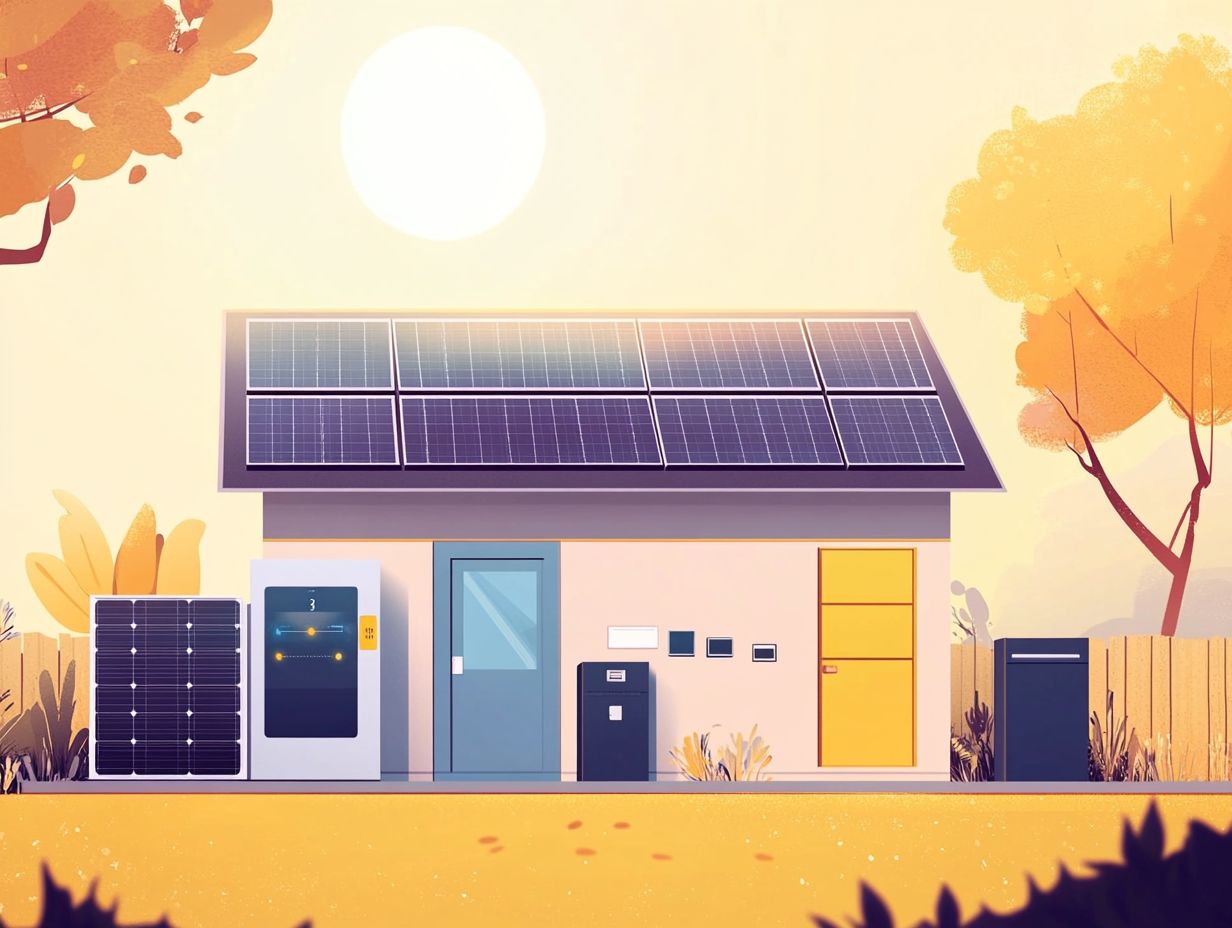
A smart solar system is an advanced solar technology setup crafted to optimize energy generation and efficiency just for you. It works smoothly with different parts like solar panels, energy storage solutions, and innovative smart features that collectively enhance performance while significantly reducing the environmental impact of traditional energy sources.
This integrated approach ensures you’re harnessing solar energy in the most effective manner, maximizing output and cutting down your reliance on fossil fuels. Among these systems, solar panels that capture sunlight from both sides truly excel, further elevating your energy production.
Integrated solar heating systems work efficiently to convert sunlight into thermal energy, providing hot water for your residential or commercial needs. Let s not overlook the vital role of devices that convert the electricity produced by solar panels into a form usable by your home; they expertly facilitate this process.
When all these components work together in perfect harmony, they significantly enhance your energy efficiency and pave the way for a more sustainable energy future.
What Are the Advantages of Remote Monitoring and Control?
The advantages of remote monitoring and control in smart solar systems significantly elevate energy efficiency, granting you access to real-time data that gives you the power to optimize solar power consumption and address issues promptly.
By harnessing cutting-edge technologies, you can enjoy notable cost savings on energy bills while ensuring the reliability of your system. For example, a residential project that embraced remote monitoring reported a 20% reduction in maintenance costs, thanks to early detection of issues. Commercial facilities have also thrived, benefiting from user-friendly dashboards that enable operators to manage multiple systems effortlessly from any location.
This approach not only streamlines operations but also fosters improved energy management practices. You ll receive alerts about performance dips or maintenance needs, ensuring that productivity remains at its peak.
Successful implementations around the globe continue to highlight the transformative impact of remote monitoring in the realm of solar energy utilization.
How Does Energy Storage Benefit Smart Solar Systems?
Energy storage systems, like solar batteries such as the Tesla Powerwall, provide numerous advantages. They offer energy independence, ensuring renewable energy is always available during peak demand or when sunlight is limited.
These solutions empower you to manage your energy needs effectively. They significantly lower your reliance on fossil fuels by maximizing the use of clean energy sources.
With efficient energy storage, solar power becomes not just reliable but also practical. It enables you to harness solar energy even on cloudy days or at night, enhancing your overall energy resilience.
Make the leap towards a sustainable future today, encouraging a shift away from conventional power generation methods.
Why Is Predictive Maintenance Important for Smart Solar Systems?
Using smart technology to predict and prevent problems in solar systems helps you anticipate potential issues. This boosts energy efficiency and ensures the durability of your components.
By embracing technologies like IoT sensors devices that connect to the internet to collect and share data and machine learning algorithms, you can gather and analyze real-time data. This gives you the power to spot anomalies before they escalate into major failures.
With this proactive strategy, you minimize downtime and optimize your maintenance schedules. This ultimately translates into significant cost savings.
Using remote monitoring systems and predictive analytics reinforces your commitment to maximizing both the lifespan and performance of your solar installations.
What Can Real-Time Data Analysis Tell Us About Solar Energy Usage?
Real-time data analysis provides valuable insights into how you use solar energy. It helps you spot patterns that optimize energy efficiency and make informed decisions that elevate overall system performance.
By integrating various types of data, such as solar irradiance levels and temperature fluctuations, you obtain a clearer view of energy consumption trends. This analysis enables you to pinpoint peak usage times and discover energy-saving opportunities.
Understanding these trends has significant implications for crafting effective energy practices. It gives you the power to adjust your consumption habits and invest in smart technologies that enhance sustainability while reducing costs.
How Can Scalability and Flexibility Affect the Performance of a Smart Solar System?
Scalability and flexibility are crucial for your smart solar system. They allow you to adapt your solar panel setup as your energy needs change.
With scalability on your side, you can effortlessly add more solar panels or energy storage solutions, ensuring that your household or business can meet increased energy demands without significant overhauls.
Flexibility enhances this capability by offering customized options tailored to your unique demands. Whether you need to adapt to seasonal energy fluctuations or integrate smart home technologies, the combination of scalability and flexibility gives you the power to optimize your renewable energy systems for maximum efficiency.
Understand the Potential Drawbacks of Smart Solar Systems
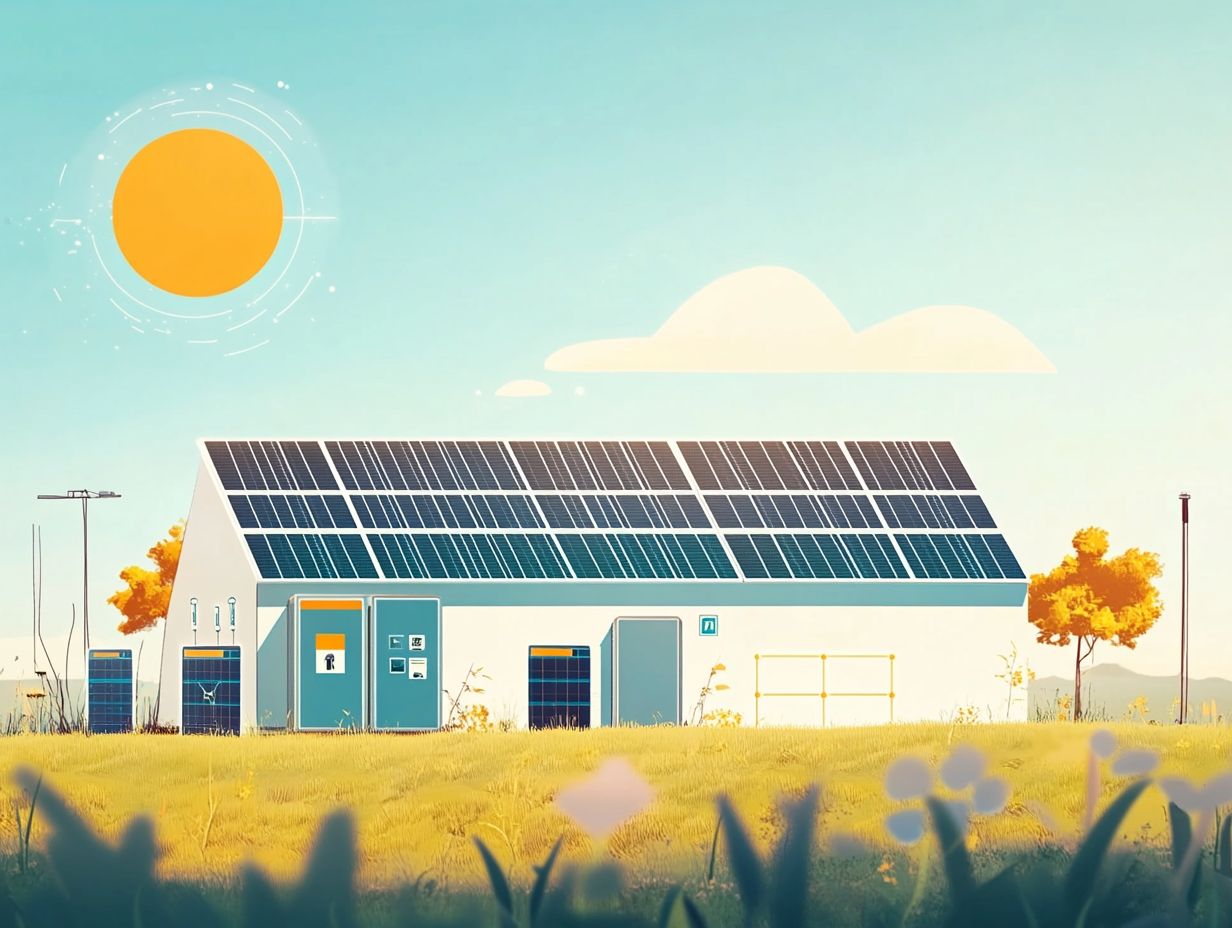
While smart solar systems present a wealth of advantages, there are also potential drawbacks you should consider. Initial energy costs, a variety of technology options, and specific installation requirements can all influence your decision to adopt these systems.
Navigating these challenges might feel overwhelming, especially when you think about the large initial cost for installation. The sheer variety of available technologies can make your head spin. It s essential to sift through a range of products that vary in efficiency, compatibility, and pricing.
Installation itself can bring its own set of technical hurdles, such as doing proper site checks and ensuring seamless integration with your existing infrastructure.
Don’t be discouraged; various financing options, government incentives, and innovations in solar technology are steadily addressing these concerns, making it increasingly feasible for you to tap into the remarkable benefits that smart solar systems offer.
Discover How a Smart Solar System Can Benefit Homeowners and Businesses
Smart solar systems provide a wealth of benefits for both homeowners and businesses. You can enhance your energy efficiency, reduce your reliance on fossil fuels, and enjoy long-term cost savings through optimized energy generation.
These systems not only play a crucial role in creating a healthier planet by significantly lowering carbon footprints, but they also give you the chance to achieve energy independence, lessening your vulnerability to fluctuating energy prices.
As a homeowner, you can take advantage of tax incentives and rebates, making that initial investment much more manageable. For businesses, it s an opportunity to do good for the community while simultaneously lowering operational costs.
Ultimately, by embracing smart solar technology, you re making a smart financial move and contributing to sustainable practices across various sectors, helping to foster a community-wide shift toward greener energy solutions.
Understand Future Developments in Smart Solar Technology
Future developments in smart solar technology are set to transform the renewable energy landscape, with cutting-edge advancements in solar batteries, energy management systems, and smart features designed to elevate both efficiency and user experience.
These innovations are not just about squeezing every last drop of energy output; they’re about giving you the power to monitor your systems in real time. This capability allows you to make data-driven decisions that can lead to substantial cost savings.
As artificial intelligence integrates into these systems, using data to predict your energy needs will enable you to optimize your usage accordingly.
The emergence of decentralized energy grids, fueled by smart solar solutions, promises to empower communities, enhance resilience, and reduce dependence on traditional energy sources, paving the way for a more sustainable future.
Learn How to Choose the Right Smart Solar System for Your Needs
Choosing the right smart solar system demands your careful attention to various factors, including your energy needs, budget, and specific installation requirements to ensure optimal performance and satisfaction.
Start by assessing your energy consumption patterns; check your past utility bills to find your average monthly usage.
Next, take the time to compare various solar technologies, so you can pinpoint the system that aligns with both your energy demands and budget constraints.
Exploring installation options is equally important; conduct thorough research on different providers to find one with a solid reputation and glowing customer reviews.
Don t overlook potential incentives or rebates, as these can significantly impact the financial viability of your investment.
By methodically approaching each of these steps, you ll navigate your solar journey with confidence, leading to a more informed and fulfilling decision.
What Are the Cost Considerations for Installing a Smart Solar System?
Installing a smart solar system involves several costs. The initial investment, maintenance, and potential energy savings are key factors to consider.
Understanding these elements can greatly impact the overall financial benefits of solar energy for you. If you re looking to maximize your investment, a detailed breakdown of costs including equipment purchases, installation fees, and necessary permits is crucial.
While the upfront costs might seem daunting, it’s essential to focus on the long-term savings potential. This focus can lead to lower monthly energy expenses and possible tax incentives.
Explore financing options like solar loans or leasing. These flexible solutions allow you to embrace solar technology without feeling the immediate financial strain.
What Are the Environmental Benefits of Using Smart Solar Systems?
Smart solar systems significantly reduce reliance on fossil fuels. They harness renewable energy and contribute to a healthier planet.
By utilizing the sun, these systems effectively shrink your carbon footprint. This shift plays a vital role in combating climate change, as solar energy emits little to no greenhouse gases during operation.
As harmful emissions decline, pollution levels drop, resulting in improved air quality that benefits both human health and local ecosystems.
Embracing solar technology encourages your community and business to adopt sustainable energy practices. This sets a precedent for future innovations and fosters a culture of environmental responsibility.
How Can Smart Solar Systems Help with Energy Management and Conservation?
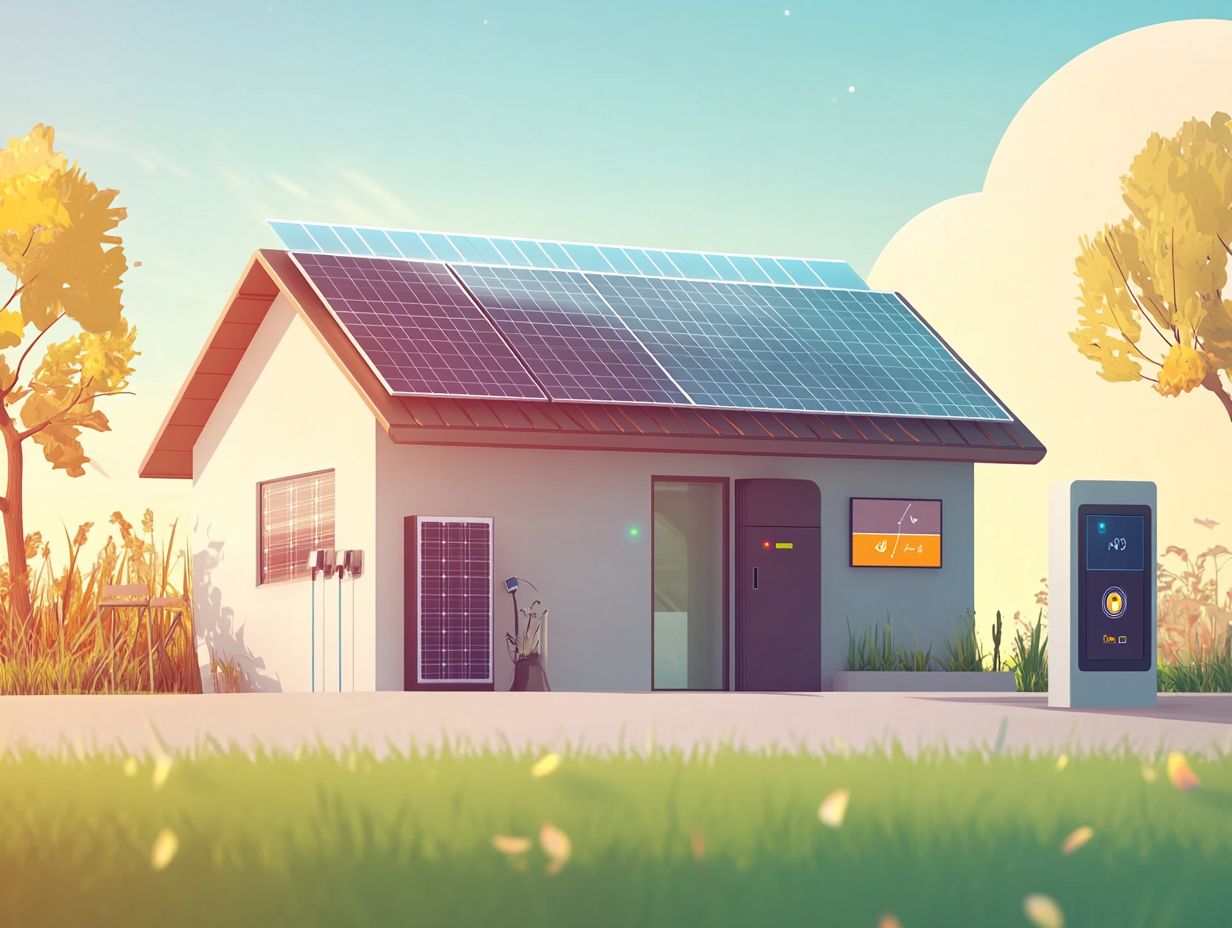
Smart solar systems are essential for effective energy management and conservation. They equip you with the tools necessary to monitor and optimize your energy usage while maximizing efficiency and sustainability.
These systems harness advanced technologies like smart meters, energy monitoring apps, and automated energy grids. This creates a holistic ecosystem for managing your electricity consumption.
For example, smart meters provide real-time insights into your energy consumption patterns, giving you the power to make informed decisions. Energy management apps can offer personalized suggestions to minimize waste, such as adjusting your appliance usage during peak hours or leveraging time-of-use electricity rates.
By integrating these technologies, you enhance your energy efficiency and embrace a more sustainable approach to resource consumption.
Frequently Asked Questions
What are the 5 essential features of smart solar systems?
The 5 essential features of smart solar systems are: advanced tracking technology, integrated energy management, remote monitoring and control, energy storage capability, and compatibility with smart home systems.
What is advanced tracking technology?
Advanced tracking technology helps solar panels follow the sun’s movement for maximum energy efficiency. This increases the overall energy production of the system, maximizing the benefits of solar energy.
How does integrated energy management work in smart solar systems?
Integrated energy management optimizes energy usage within a home or building by combining solar energy and traditional electricity. This helps to reduce energy costs and promote more sustainable energy consumption.
Can smart solar systems be remotely monitored and controlled?
Yes, one essential feature of smart solar systems is remote monitoring and control. This allows users to track their energy production and consumption, adjust settings, and troubleshoot issues remotely.
Why is energy storage capability important in smart solar systems?
Energy storage capability allows excess energy produced by the solar system to be stored for later use. This ensures that energy is available even when the sun is not shining, increasing the reliability of the system.
Ready to make a change? Explore solar solutions today and join the clean energy revolution!
Are smart solar systems compatible with smart home systems?
Yes, smart solar systems can work easily with smart home systems. This allows users to control and monitor energy usage effortlessly.
This setup boosts energy efficiency and adds convenience. Imagine controlling your energy use with just a tap on your phone!


